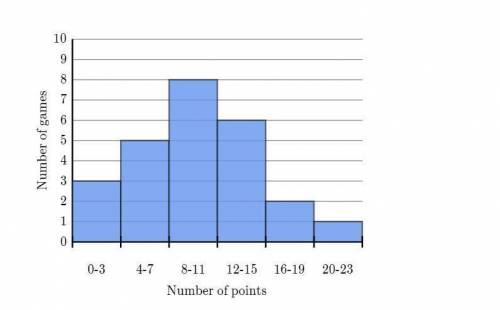 21
21 
Step-by-step explanation:
Experimetal probability = Number of favorable outcomes/Total number of outcomes
Number of favorable outcomes = 
Total number of outcomes = 
The probability that Nate scores  points next basketball game is
points next basketball game is  .
.
 21
21 
Step-by-step explanation:
Experimetal probability = Number of favorable outcomes/Total number of outcomes
Number of favorable outcomes = 
Total number of outcomes = 
The probability that Nate scores  points next basketball game is
points next basketball game is  .
.
 30
30 8/25
Step-by-step explanation:
There are 25 different amount of points, but there are 8 in the 8-11 points category. That means that most likely Nate will score 8-11 with a 8/25 chance that he will.
 30
30 8/25
Step-by-step explanation:
There are 25 different amount of points, but there are 8 in the 8-11 points category. That means that most likely Nate will score 8-11 with a 8/25 chance that he will.

Step-by-step explanation:
Given
See attachment for graph
Required
Determine the probability of getting a score of 8 - 11 points in the next game
From the attachment, the frequency of the class 8 - 11 is:

Also, from the attachment, the total frequency is:


The required probability is:



 1
1  1
1  1
1  1
1  1
1 
It will provide an instant answer!
